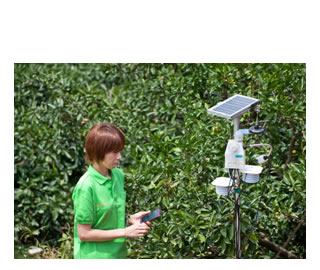Tokyo, July 07, 2011
Fujitsu Limited and Sowakajuen Co., Ltd. today announced the launch of field testing related to the use of ICT in the cultivation of mandarin oranges in Japan. The project aims to improve productivity in growing the fine-quality, delicious Arida Mikan brand of mandarin oranges.
The field test's main objectives include enabling workers to complete the proper work tasks at the appropriate times, measuring operational costs, and helping veteran farmers pass down expert knowledge to younger generations. Specifically, the project will employ cloud computing, sensors, smartphones, and PCs in the following initiatives:
- Data—including air temperature, precipitation, and soil temperature data collected by sensors in fruit groves, worker work logs recorded using smartphones, and photographs taken at the groves—will be stored at datacenters and put to future use.
- Each of the approximately 5,000 trees will be assigned an ID number with characteristics such as daily changes in growing conditions and emergence of any diseases or pests, closely managed.
- By analyzing the large quantity of data from both present and past, the information will be used for future production processes.
The field test will leverage Fujitsu's cloud computing technologies, Fujitsu Laboratories' sensor technologies, and a special smartphone application. Furthermore, the use of weather and agricultural data, as well as the delivery of past data, will be handled under the guidance and cooperation of the fruit testing laboratory of the Wakayama Research Center of Agriculture, Forestry and Fisheries.
The city of Arida in Wakayama Prefecture intends to use the results from the field test to strengthen the Arida Mikan brand and revitalize the region. At the same time, the city will help promote the understanding of the technologies employed during the test and spread their use among mandarin orange growers in Arida City.
Challenges Faced by Sowakajuen
Based in Wakayama Prefecture, which boasts the highest mandarin orange output in Japan, Sowakajuen is engaged in the cultivation of high-quality mandarin oranges and the production of 13 kinds of products made from mandarin oranges, including juice and jelly, on its spacious 60,000m2 ranch. Since its launch in 1979 as a full-time family farm, Sowakajuen has continued to grow, eventually becoming a limited liability company in 2000 and a corporation in 2005. The company currently generates annual revenue of approximately 400 million yen.
To date, Sowakajuen has cultivated the finest quality orange mandarins by relying on years of accumulated know-how, the experience of its employees, and tacit knowledge. In order to further improve its productivity, however, the company faces a number of challenges, including the standardization of work tasks, measuring the costs associated with each task, passing down the expert knowledge of veteran employees, and training new employees who lack farming experience.
Details on the Field Test
Objective
In a field of work that has largely depended on the tacit knowledge and skills of workers, the objective is to deploy ICT to improve productivity in growing fine-quality mandarin oranges. Another objective is to demonstrate the utility of applying ICT to this field.
Overview
1. Data will be collected using sensors and smartphones, and then stored at Fujitsu's datacenters, where employees can view and use the information through their PCs and Internet connection.
- At five sites equipped with sensors, data on air temperature, precipitation, and soil temperature will be collected at regular intervals
- A smartphone application will track the activities of workers and enable them to record observations or unusual conditions on their rounds through the groves
- Using the GPS function on their smartphones, workers' locations and movements will be automatically tracked
- Operational costs will be calculated based on the number of work hours recorded and the amount of pesticide and other materials used
2. Out of a total of 5,000 trees, each will be assigned an ID number. The characteristics of each tree including the sweetness or acidity of its mandarin oranges, the condition of the tree, and the emergence of any diseases or pests, will be managed.
 Figure 1: Smartphone application used by employees
Figure 1: Smartphone application used by employees
 Figure 2: Sensor developed by Fujitsu Laboratories (right) and employee using the smartphone application
Figure 2: Sensor developed by Fujitsu Laboratories (right) and employee using the smartphone application
3. From the vast amount of data collected, including past data, regular patterns and predictive factors relating to production will be identified for use in future production activities. The fruit testing laboratory will offer guidance on how to use the data as well as provide past data.
- From the vast amount of data collected, an attempt will be made to identify regular patterns and predictive factors in order to create rules that can be used in future production activities
- In accordance with the rules created, advice can be distributed on appropriate work patterns and timing of activities
Expected Benefits
1. People
- Educating human resources by passing on knowledge of veteran workers to younger workers and creating opportunities for learning
- Contributing to the revitalization of the region by sharing know-how
2. Production
- Production of high-quality mandarin oranges
- Making cultivation transparent by overseeing the growing conditions of mandarin orange
- Taking appropriate measures to address trees that have problems
3. Agriculture
- Standardizing operations such as the timely application of fertilizer and pesticides when necessary
- Realization of farming which produces profit through a better grasp of operational costs and enhancing the managerial mindset of workers
- Effective use of data by identifying regular patterns between the weather and the growth of mandarin oranges
Fujitsu's Agricultural Cloud Initiative
Since 2008, the Fujitsu Group has been conducting field testing of an agricultural cloud that leverages cloud computing to provide support for farm management and agricultural production sites. To date, in collaboration with companies such as Shinpuku Seika, Limited Co. (Miyakonojo City, Miyazaki Prefecture) and Fukuhara Farm (Hikone City, Saga Prefecture), Fujitsu has demonstrated substantial results through this initiative, leading to transformational changes in companies' work patterns, improved productivity, and the training of a new generation of farmers. As part of the new field test, Fujitsu will work together with Sowakajuen to further illustrate the effects of deploying agricultural cloud services.
The agricultural cloud utilizes Fujitsu's FGCP/S5 global cloud platform service (known as "On-Demand Virtual System Service" prior to June 2011), which offers servers, storage, and other ICT infrastructure via a network from Fujitsu's datacenters.
By offering cloud services, Fujitsu aims to leverage the power of ICT to help address a wide range of problems facing society, while enabling the creation of a comfortable and convenient human-centric intelligent society that is both prosperous and secure. The agricultural cloud is a part of this vision.

